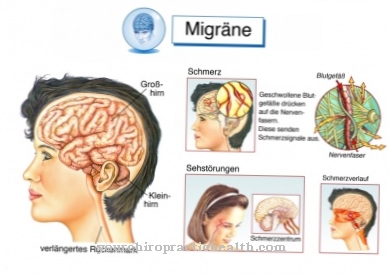Dysphagia is the medical term for difficulty swallowing. These can be acute or develop into a chronic symptom that can have several causes. Treatment for dysphagia targets the cause of the discomfort and may include swallowing therapy, medication, and surgery.
What is dysphagia?

© joshya - stock.adobe.com
Dysphagia refers to difficulty swallowing. This means that it means more effort and effort for the person to move food and fluids from the mouth to the stomach.
Dysphagia can also be related to pain in this context. In serious cases it can even happen that the affected person is no longer able to swallow at all. Isolated swallowing difficulties are usually no cause for concern and usually go away on their own.
However, persistent dysphagia may be a sign of a serious illness and needs targeted treatment. Dysphagia can occur at any age, but it is much more common in the elderly. The causes of dysphagia can be many and treatment depends on these causes.
causes
50 muscles play an important role in the simple activity of swallowing. Therefore, many disorders can affect swallowing. A subset of these problems is called oesophageal dysphagia describes and isolates physical problems in the esophagus.
These include, for example, achalasia, in which the lower muscle in the esophagus cannot be properly relaxed to allow food to enter the stomach. There is also the diffuse esophageal spasm, which causes involuntary twitching when swallowing, making it extremely difficult. However, tumors, swallowed foreign bodies or gastroesophageal reflux disease can also lead to dysphagia.
In oropharyngeal dysphagia, there is a weakening of the muscles. This can be triggered by neurological disorders, triggered for example by post-polio syndrome or multiple sclerosis; but neurological damage, triggered by strokes or spinal column damage, can also trigger dysphagia.
You can find your medication here
➔ Medicines for sore throats and difficulty swallowingSymptoms, ailments & signs
With dysphagia, those affected generally have very severe difficulty swallowing. These can be of different severity, the severity and further course of which depend very much on the exact cause of the dysphagia. The difficulty swallowing can make it difficult to take food and liquids, so that some patients also suffer from dehydration or various deficiency symptoms.
This can also lead to other diseases. Especially in children, dysphagia leads to delayed development and thus to various complaints in adulthood. In some cases, the symptoms are so severe that they vomit. This can also lead to coughing or difficulty breathing.
If the breathing difficulties are not treated, damage to the internal organs or the brain can occur in the further course. Many affected people also lose consciousness and can potentially injure themselves if they fall. With dysphagia, no general prediction can be made about the life expectancy of the person affected.
However, if the disease is not treated, it is usually reduced. In some cases, the dysphagia can also lead to significantly increased salivation.
Diagnosis & course
Tests that may be used to diagnose dysphagia include:
X-ray with contrast agent: In this procedure, the patient will swallow a barium solution, which covers the inner walls of the esophagus and allows better images to be taken with the X-ray machine. Changes in the esophagus can thus be better identified; from these, the doctor can draw conclusions about muscle development. Possibly. something has to be swallowed to observe muscle movement.
Dynamic swallow study: In this test, the patient swallows food that is coated with barium. Using the imaging process, the doctor can now determine exactly which errors occur in the swallowing process.
Endoscopy: The doctor can use a thin tube to check the inside of the esophagus and identify possible causes of the dysphagia.
Complications
Dysphagia often makes it difficult to consume food and fluids. Malnutrition is therefore a possible complication of the swallowing disorder. In addition, it often happens that those affected drink too little - for example because of pain when swallowing or for fear of choking.
Ingestion is a general risk of dysphagia. Medicine speaks of aspiration in this context. With this complication, parts of the food can get into the lungs, which usually leads to pain. The foreign bodies can cause damage to the lungs and also promote infections. If there is any suspicion that foreign objects have entered the lungs, medical attention is required.
Waiting long to receive treatment also increases the risk of complications. Bronchoscopy can often remove aspirated parts from the lungs without the need for surgery. In some cases, aspiration can lead to another complication: aspiration pneumonia.
This is a special form of pneumonia that occurs when you breathe in foreign objects. It can occur especially when the foreign body is contaminated. An example of this is vomit. In addition, foreign body aspiration can impede breathing and lead to a lack of oxygen in the body. In this case, too, medical assistance (e.g. from an emergency doctor) is required.
When should you go to the doctor?
If you have chronic swallowing problems, you should definitely speak to a doctor. Patients who repeatedly feel pressure or lump in their throat or who have a noticeable gag reflex may suffer from dysphagia. Other symptoms that must be clarified: choking up food that has already been swallowed, coughing or aspiration while eating and excessive salivation. In extreme cases, the person concerned can no longer eat any more - then a hospital must be visited immediately.
Elderly people and patients with other diseases of the esophagus or lungs are particularly at risk. Swallowing disorders are also increasingly common in multiple sclerosis and ALS. Anyone who belongs to these risk groups should speak to a doctor immediately. In the case of multiple sclerosis and ALS, the dysphagia is often only noticed by relatives at first.
It is advisable to inform the responsible doctor quickly so that he can initiate an appropriate therapy. If there are signs of pneumonia, an emergency doctor should be called. If the person concerned passes out, first aid must be given immediately.
Doctors & therapists in your area
Treatment & Therapy
The treatment of dysphagia is usually specially adapted to the different causes. In the case of oropharyngeal dysphagia, the affected person may be referred to a speech and swallowing therapist.
He will guide targeted exercises to solve the muscle problem and teach tricks on how to make swallowing easier in everyday life. Oesophageal dysphagia can narrow the muscles in the esophagus. In this case, an endoscope can be used to insert a small balloon that can slowly expand the narrowing. If the symptoms are triggered by a benign or malignant tumor, it may have to be surgically removed.
If the dysphagia is caused by rising stomach acid, this harmful reflux can be reduced with medication. This medication may have to be carried out over a longer period of time. In the case of very severe forms of dysphagia, it is often necessary for the person affected to follow a diet with special liquid food, or to receive a gastric tube to ensure the nutrition.
Outlook & forecast
As a rule, the further course of the dysphagia depends very much on its exact cause. For this reason, a general prediction of the course of the disease is not possible. In most cases of dysphagia, however, medical treatment is necessary to relieve the symptoms.
Self-healing occurs only in a few cases and especially in very mild illnesses. This includes a cold, for example, in which the difficulty swallowing usually disappears on its own or can be treated relatively well by means of self-help. If the dysphagia is not treated, there will be discomfort when taking food and fluids, so that the patient may suffer from dehydration and deficiency symptoms. In children, the disease can lead to impaired and slowed development and have a very negative effect on the quality of life.
In most cases, once the cause of the disease is diagnosed, dysphagia can be treated well. An early diagnosis and treatment always have a positive effect on the further course of the disease.
You can find your medication here
➔ Medicines for sore throats and difficulty swallowingprevention
Dysphagia cannot be prevented, especially if the cause is a serious disorder caused by neurological problems. Short-term swallowing problems can, however, be avoided by sufficient chewing and careful swallowing. Early treatment for gastroesophageal reflux disease can prevent the disorder from causing too much damage to the esophagus and developing dysphagia.
Aftercare
The measures and options for dysphagia are in most cases severely limited. First and foremost, a comprehensive and early diagnosis of the disease must be made so that there are no further complications and no further worsening of the symptoms. In any case, early detection of the disease has a positive effect on the further course of the dysphagia.
However, the identification of the underlying disease is also very important in order to limit the dysphagia completely. In most cases, the symptoms can be relieved by various exercises. The patient can also do these exercises at home to accelerate the healing process. However, in many cases, medication is also necessary to relieve the dysphagia.
It is important to ensure regular intake and even dosage. If you have any questions or are unclear, you should always consult a doctor first. Whether the dysphagia will reduce the life expectancy of the person affected cannot generally be predicted. Further examinations of the stomach can also be useful in order to identify symptoms.
You can do that yourself
When treating dysphagia, it is often necessary to perform swallowing therapy, which requires the patient's cooperation. Of course, the success of this therapy also depends on the cause. In severe cases, however, this method of treatment is often not enough. In addition to operations, breathing aids or tube feeding are necessary here.
Swallowing therapy is intended to improve the impaired swallowing function and prevent food residues from being swallowed. In this way, the movements of the muscles of the lips, cheeks, the chewing apparatus or the tongue can be specifically stimulated. The training of these muscle groups improves not only the chewing and swallowing function but also speaking. The complex interaction of the muscle groups in this area is promoted in such a way that, ideally, the swallowing function can even return to normal.
The prerequisite for this training is maintaining certain head and body positions. Such exercises as "Shaker", the "Mendelsohn maneuver" or "Masako" are carried out. For example, Shaker improves the opening movement of the upper sphincter in the esophagus. In the Mendelsohn maneuver, the tongue and larynx are trained so that the upper esophageal entrance can be kept open longer.
This protects the airways and the transport of food. In Masako, the tongue is held in place by the incisors when swallowing. In addition to swallowing therapy, the consistency, composition or nutritional content of the food should also be optimized in order to establish new connections to the brain more quickly.


.jpg)





















.jpg)



